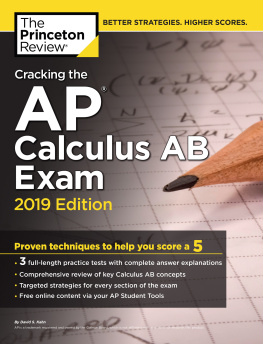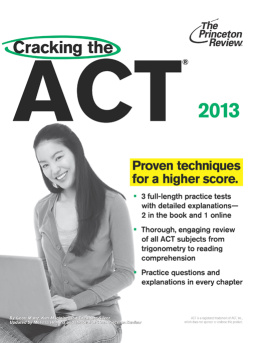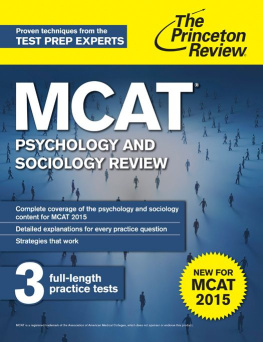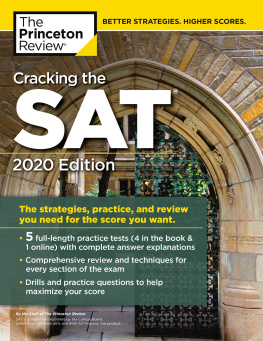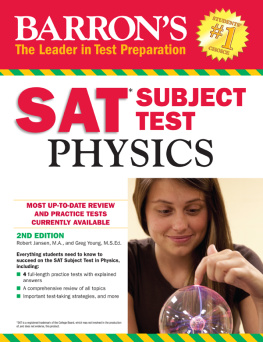
Editorial
Rob Franek, Senior VP, Publisher
Mary Beth Garrick, Director of Production
Selena Coppock, Senior Editor
Calvin Cato, Editor
Kristen OToole, Editor
Meave Shelton, Editor
Random House Publishing Team
Tom Russell, Publisher
Nicole Benhabib, Publishing Director
Ellen L. Reed, Production Manager
Alison Stoltzfus, Managing Editor
The Princeton Review, Inc.
111 Speen Street, Suite 550
Framingham, MA 01701
E-mail:
Copyright 2013 by TPR Education IP Holdings, LLC.
Cover art Jonathan Pozniak
All rights reserved. Published in the United States by Random House, Inc., New York, and in Canada by Random House of Canada Limited, Toronto.
eBook ISBN: 978-0-307-94575-4
Trade Paperback ISBN: 978-0-307-94555-6
SAT is a registered trademark of the College Board, which does not sponsor or endorse this product.
The Princeton Review is not affiliated with Princeton University.
Editor: Meave Shelton
Production Editor: Kiley Pulliam
Production Artist: Craig Patches
20132014 Edition
v3.1
Acknowledgments
My thanks and appreciation to John Katzman, Steve Quattrociocchi, Jeff Rubenstein, Kris Gamache, Dan Edmonds, and Suellen Glasser, for making me feel at home; to Rachel Warren, Kate ONeill, Melissa Kavonic, and Jeff Soloway for their support and fantastic editing, and to the production team for their beautiful work. Thanks to Paul Kanarek for his friendship, counsel, and encouragement.
Special thanks to Douglas Laurence for his work on the latest revision of this book.
A special thanks to Adam Robinson, who conceived of and perfected the Joe Bloggs approach to standardized tests and many of the other successful techniques used by The Princeton Review.
Dedication
This work is dedicated to the memory of my great aunt, Norma Perron Lamb Piette.
Contents
18 The Princeton Review Practice
SAT Physics Subject Test 1
19 Answers and Explanations to
Practice SAT Physics Subject Test 1
20 The Princeton Review Practice
SAT Physics Subject Test 2
21 Answers and Explanations to
Practice SAT Physics Subject Test 2
Introduction
The SAT Subject Tests are a series of one-hour exams developed and administered by Educational Testing Service (ETS) and the College Board. Unlike the SAT, the SAT Subject Tests are designed to measure specific knowledge in specific areas. There are many different tests in many different subject areas, such as biology, history, French, and math. They are scored separately on a scale from 200 to 800.
How Are SAT Subject Tests Used by College Admissions?
Since the tests are given in specific areas, colleges use them as another piece of admissions information and, often, to decide whether an applicant can be exempted from college course requirements. For example, a certain score may excuse you from a basic science class or a foreign language requirement.
Should I Take the SAT Subject Tests? How Many? When?
About one third of the colleges that require SAT scores also require that you take two or three SAT Subject Tests. Your first order of business is to start reading those college catalogs and websites. College guidebooks, admissions offices, and guidance counselors should have this information as well.
As to which tests you should take, the answer is simple. Take the SAT Subject Tests
- on which you will do well.
- that may be required by the colleges to which you are applying.
Some colleges have specific requirements, while others do not. Again, start asking questions before you start taking tests. Once you find out which tests, if any, are required, part of your decision making is done. The next step is to find out which of the tests will highlight your particular strengths. Colleges that require specific tests generally suggest that you take two subject tests from the following five groups: laboratory science, history, foreign language, math, and English literature.
As for timing, take the tests as close as possible to the corresponding coursework you may be doing. If you plan to take the SAT Physics Subject Test, for example, and you are currently taking physics in high school, dont postpone the test until next year.
When Are the SAT Subject Tests Offered?
In general, you can take from one to three Subject Tests per test date in October, November, December, January, May, and June at test sites across the country. Not all subjects are offered at each administration, so check the dates carefully.
How Do I Register for the Tests?
To register by mail, pick up The Paper Registration Guide for the SAT and SAT Subject Tests at your guidance counselors office. You can also register at the College Board website, http://sat.collegeboard.org. This site also contains useful information, such as the test dates and fees. If you have questions, you can talk to a representative at the College Board by calling 1-866-756-7346 from within the United States or 212-713-7789 from outside the country.
You may have your scores sent to you, to your school, and to four colleges of your choice. Additional reports will be sent to additional colleges foryou guessed itadditional money. Scores are made available to students via the College Boards website. To find out about the timeline of when the scores are made available, visit http://sat.collegeboard.org.
Whats a Good Score?
Thats hard to say, exactly. A good score is one that fits in the range of scores for which the college of your choice usually accepts. However, if your score falls below the normal score range for Podunk University, that doesnt mean you wont go to Podunk University. Schools are usually fairly flexible in what they are willing to look at as a good score for a particular student.
Along with your score, you will also receive a percentile rank. That number tells you how you fit in with the other test takers. In other words, a percentile rank of 60 means that 40 percent of the test takers scored above you and 60 percent scored below you.
A Couple of Words about Score Choice
As of February 2009, you can choose which SAT Subject Test scores you want colleges to see. This is great news! For one thing, if you take more than one SAT Subject Test on a given test date, youll be able to choose which tests from that date youd like to submit to colleges. So if, for example, you take the French test followed by the chemistry test, but you dont think the chemistry test went very well, you can simply opt out of having that chemistry score sent to your schools.
The score reporting policy is optional for students. This means that you arent required to opt in and actively choose which specific scores you would like sent to colleges. If you decide not to use the score-reporting feature, then all of the scores on file will automatically be sent when you request score reports. For more information about the new score-reporting policy, go to the College Board website at www.collegeboard.org.
Whats on the SAT Physics Subject Test?
The SAT Physics Subject Test contains 75 multiple-choice questions, and the time limit is 1 hour. The topics covered (which are listed below) are those most likely to be studied in a standard college-prep level high school physics course. The following list includes the major topics covered on the SAT Physics Subject Test, along with the corresponding chapters in this book and an approximate percentage of the questions on each.



